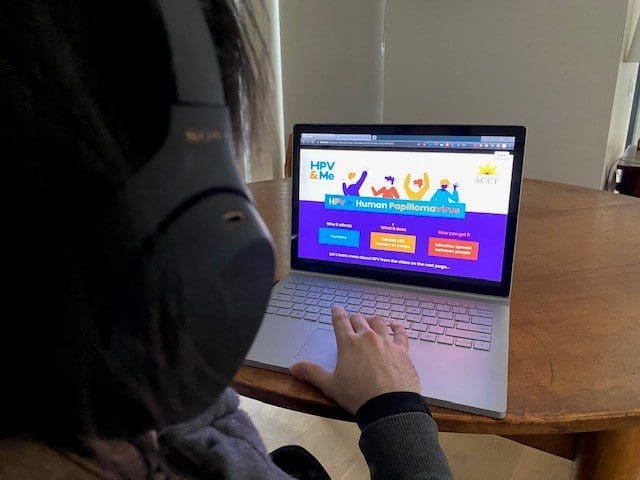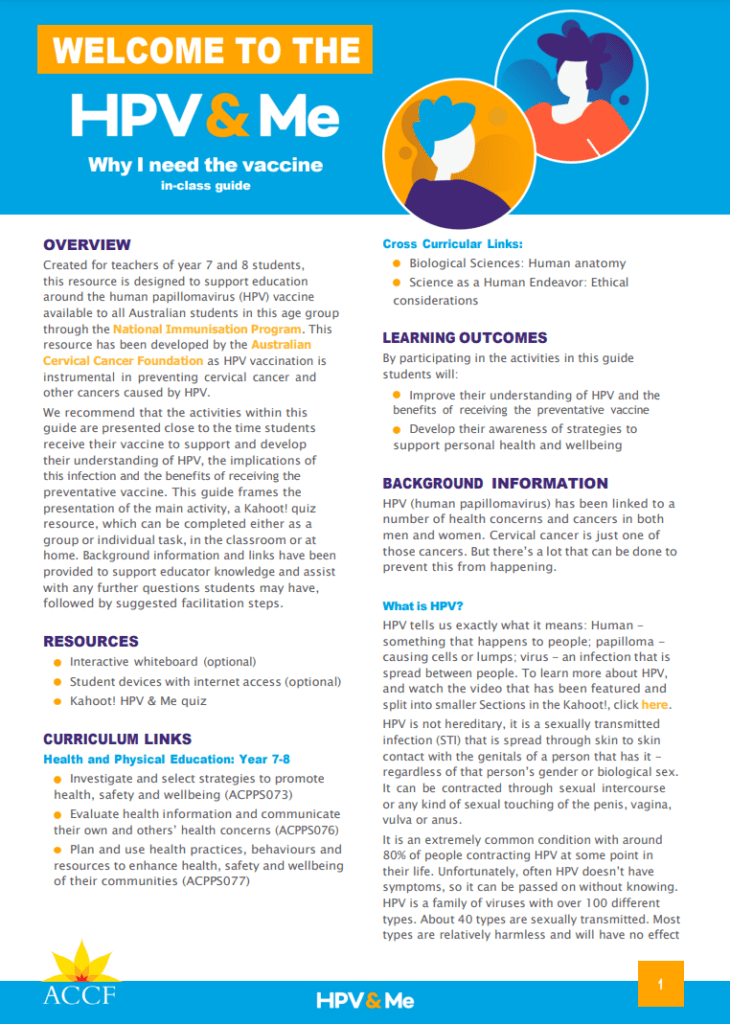
The HPV & Me Awareness Program for Schools is a FREE digital program which educates high-school students on preventive strategies, such as the vaccination for HPV, to reduce the health risks associated with the Human Papillomavirus (HPV). HPV & Me provides teachers and parents with the tools they need to empower young people to take control over their health.
Our program is designed by an experienced educator who has worked extensively in health at the school and tertiary level. Input from students, teachers, parents and professionals has been instrumental to the program development.
Find out more about HPV by visiting FAQs for Students
Access the student activity on Kahoot!
Use Game PIN: 006993872
Years 7 and 8: Why I need the vaccine
Years 9-12: Eyes on this STI COMING SOON ONLINE!



ACCF has developed online resources to educate Year 7 and 8 students about HPV and prepare them for receiving the HPV vaccine in Australia. The program is delivered on Kahoot! and can be utilised in the classroom or at home.
For more information, visit below our FAQs for Parents & Teachers
Teacher Guide provides background information including curriculum links, learning outcomes and information to assist with lesson planning.
Don’t take our words for it, check out for yourself what our parents, teachers and students say about HPV & Me.
As HPV affects everyone, students of all genders.
Currently, HPV & Me is offered free of charge.
Known as the ‘common cold’ of sexually transmissible infections, most people will contract HPV at some point in their lives. While often HPV has no symptoms and goes away by itself, a persistent HPV infection can cause health concerns such as genital warts and cancers that affect both women and men. It is important that students are armed with knowledge of how they can reduce their risk of these health concerns and make positive choices about their behaviour as they move towards adulthood.
Venue/s with a computer connected to data projector and audio and a webcam facing the students.
Online: Groups of 30 students per computer/venue, max of 4 groups (120)
Yes.
Our programs are delivered virtually or via the web resources. If you are interested in a face-to-face presentation or someone to talk about the HPV vaccination programs at a school assembly, please contact education@accf.org.au
We are happy to work with you to tailor our program to meet your needs. If you have queries as to how this can fit in with Senior Studies subjects, please get in touch at education@accf.org.au
Yes. Eyes on this STI builds on knowledge gained in Why I need the vaccine. Any overlap in content is to ensure student understanding.
If your question has not been answered, please send it to education@accf.org.au
We hope you enjoy participating in the HPV & Me program. Below are some Frequently Asked Questions to add to what you have learnt during the program. If your question is not answered, then please contact info@accf.org.au
HPV stands for human papillomavirus. It is an extremely common sexually transmitted infection, with 80% of both men and women coming in contact with the virus at some point in their life. There are over 100 different types of HPV, the majority of which are harmless.
While there are around 200 different types of HPV, not all are sexually transmitted (e.g., those that cause warts on the hands or feet). For the types of HPV that are sexually transmitted, they can only be transmitted when there’s contact with the skin around the genitals. That could be when there is contact between:
Currently, there is no conclusive evidence that open-mouthed kissing with tongue (French kissing) can transfer an infection.
It is unlikely you will contract HPV if you have not had any type of sexual intercourse. However, as HPV is spread through skin-to-skin contact with the genitals it is possible that other types of sexual contact could spread HPV.
If you have had any sexual contact with the genitals, then it increases your risk of contracting HPV.
Yes. Using condoms does lower your risk of contracting HPV; that is why practising safe sex is one of the three S’s for preventing HPV. However, as HPV is transmitted via skin-to-skin contact rather than bodily fluids, condoms cannot provide full protection from contracting HPV as they do not cover the whole genital area. The use of condoms is highly encouraged as they provide valuable protection against many STIs including some protection against HPV and unplanned pregnancy.
Most people who contract HPV will not know that they have it, as most types of HPV, including those that most commonly lead to cancer, do not produce symptoms. However, some types of HPV can cause genital warts (small lumps) to develop. These might be uncomfortable and need to be treated but will not cause long term harm.
Remember, most types of HPV will clear up before you even know that you have it. For people with a cervix, the most effective way to detect HPV is through regular Cervical Screening Tests from age 25.
The vaccine is made from tiny proteins that look like the outside of the real human papillomavirus. The vaccine does not contain any live virus, or even killed virus or DNA from the virus, so it cannot cause cancer or other HPV-related illnesses. Rather, the vaccine is made to “look” like the real virus, so your immune system is tricked in to making virus-fighting antibodies. This means that if, or when your body encounters the real HPV virus, your body will recognise it and know how to clear it from your system.
Essentially there are two reasons – first, because the vaccine is most effective if administered before you have been exposed to HPV through sexual activity. Secondly, studies have shown that the body’s immune response to the vaccine is best between the ages of 9 and 14.
Like other vaccines, you may experience some pain or soreness around the vaccine site for a few hours or a day after the vaccine is given. This is short term and worth the long-term benefit of preventing serious illness from HPV-related cancers.
Most people do not experience any side effects from the vaccine. Common side effects of the HPV vaccine that may occur include:
Side effects are generally experienced for a short period of time.
Some people have allergic reactions to ingredients in vaccines. If you have a history of allergic reactions to other vaccines, please consult your doctor to discuss whether the HPV vaccine is appropriate for you.
All individuals are eligible to receive the HPV vaccine for free through the National Immunisation Program up until you turn 26. Individuals can receive the catch-up doses through a GP or local immunisation provider.